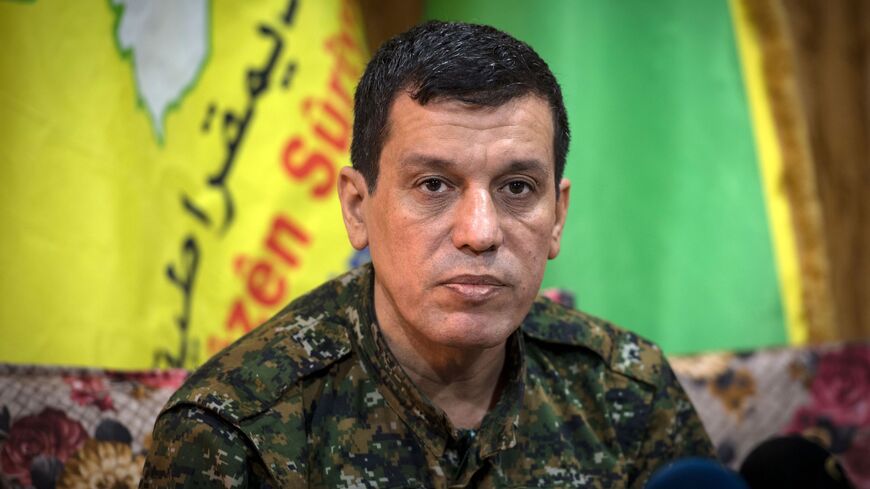US military officials confirmed that the commander-in-chief of the US-backed Syrian Democratic Forces (SDF), Mazlum Kobane, was targeted in a drone strike in the Iraqi Kurdish province of Sulaimaniyah Friday. Three US military personnel were in the convoy with Kobane at the time of the attack, as first reported by The Wall Street Journal. There were no casualties, US Central Command (CENTCOM) spokesman Col. Joe Buccino told Al-Monitor.
CENTCOM's account of the incident contradicted an earlier statement by SDF spokesperson Farhad Shami who insisted via Twitter that the reports concerning an attack on Kobane were “fake news” that were “intended as political blackmail against some forces in southern [Iraqi] Kurdistan.”
The Journal reported that Western officials believe that the drone strike close to Sulaimaniyah International Airport was carried out by Turkey. Ankara has yet to formally comment, but Turkey has been targeting senior SDF officials with drones inside northeast Syria on the grounds that they are linked to the outlawed Kurdistan Workers Party (PKK), the militant group that is fighting the Turkish army for Kurdish autonomy from its bases inside Iraqi Kurdistan. Numerous PKK commanders have been killed in such attacks both in Syria and in Iraq.
Local officials said the blast occurred near the perimeter of the airport at 4:18 p.m. local time, causing no material damage or casualties. A fire caused by the explosion was extinguished.
Kobane, the Pentagon’s chief ally in the fight against the Islamic State, is on Turkey’s most wanted list of terrorists and has survived several assassination attempts already. Should Turkey, a key NATO member, prove to be responsible, this will put even further strain on its shaky relations with the United States. Turkey is already under congressional sanctions over its 2019 invasion of a large chunk of northeast Syria, with military sales to Ankara effectively banned.
The attack comes just days after Turkey sealed its airspace to flights to and from Sulaimaniyah, which is administered by the Patriotic Union of Kurdistan (PUK), the second-largest party in the Kurdistan Region of Iraq. Turkey says the PUK has been facilitating an air bridge allowing PKK militants to move back and forth between Syria and Sulaimaniyah. The claims came in the wake of the mystery crash that brought down two helicopters March 15 as they were ferrying nine SDF counterterrorism personnel, including Kobane’s nephew, from Sulaimaniyah to Hasakah in northeast Syria. The Kurdistan Regional Government (KRG) initially claimed that the victims were PKK militants.
Well-placed sources, speaking on condition of anonymity, told Al-Monitor that KRG Prime Minister Masrour Barzani had complained about the air transport of SDF personnel between northeast Syria and Sulaimaniyah to Secretary of State Antony Blinken. The sources said Barzani demanded an end to these flights. The United States has denied any connection to the helicopters involved in the crash. CENTCOM does, however, facilitate travel for senior Syrian Kurdish officials when it involves US-led coalition business.
This week Turkish presidential spokesperson Ibrahim Kalin said that the PKK had a very serious presence in Sulaimaniyah.
In a statement following Friday’s attack, KRG spokesperson Jotiar Adil appeared to support Turkey’s position. In a thinly disguised jab at the PUK, Adil asserted, “This dangerous situation is the result of the occupation of government institutions and their use for illegal activities.”
Qubad Talabani, deputy prime minister of the KRG and brother of PUK Chairman Bafel Talabani, retorted that Adil spoke for the rival Kurdistan Democratic Party, which leads the government, and “in no way can he talk for the whole government.”
“Targeting a civilian airport,” Talabani said, “is not only breaching Iraq’s sovereignty, but is also a dangerous escalation on the lives of the people of Kurdistan.”
In November, a Turkish drone strike hit a base in Hasakah used jointly by the SDF and the US-led coalition, killing two SDF personnel. The Pentagon said the strikes “directly threatened the safety of US personnel.”
Ankara has long been pressuring the United States to axe its partnership with the SDF on the grounds that they are no different than the PKK and pose a threat to Turkey’s national security.
Pentagon correspondent Jared Szuba contributed to this report.








